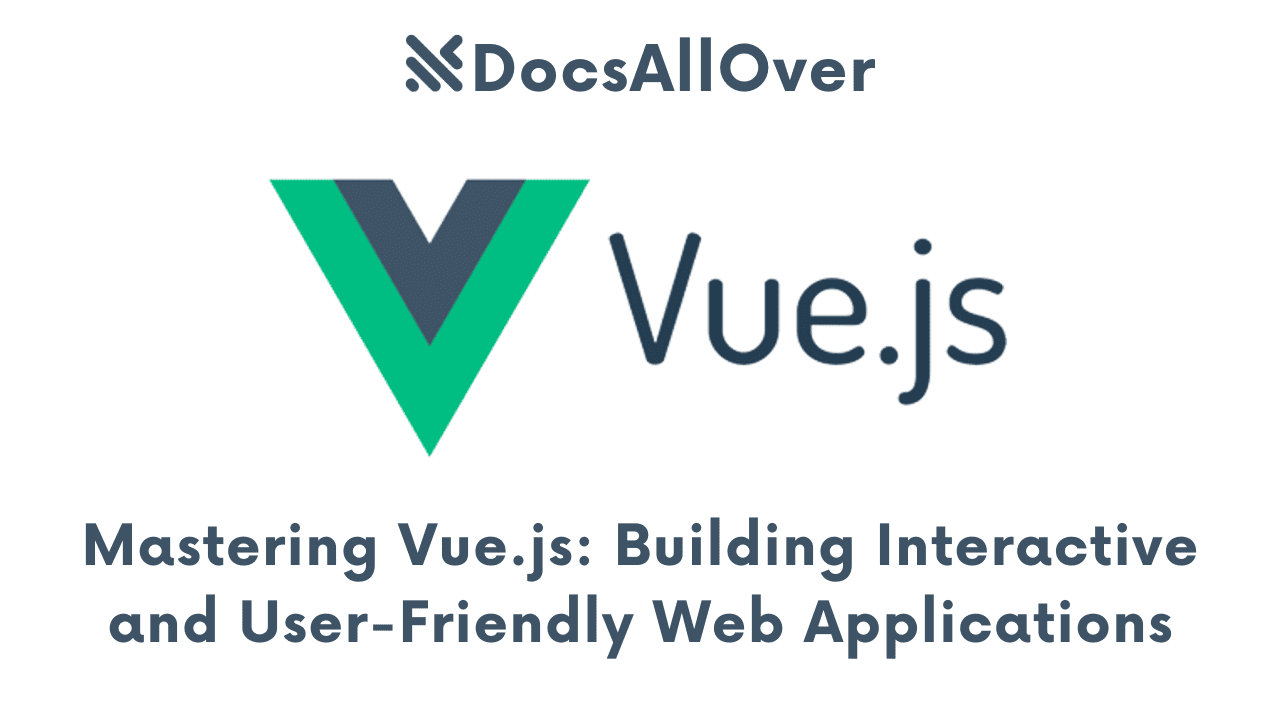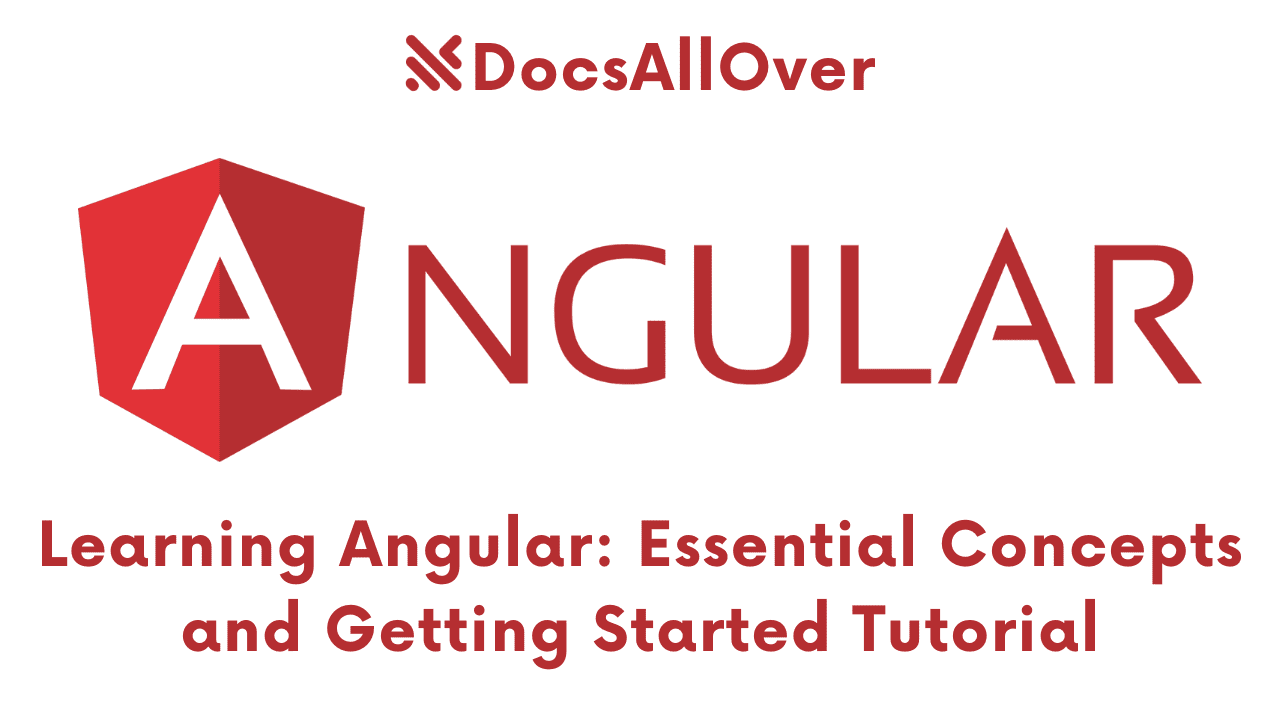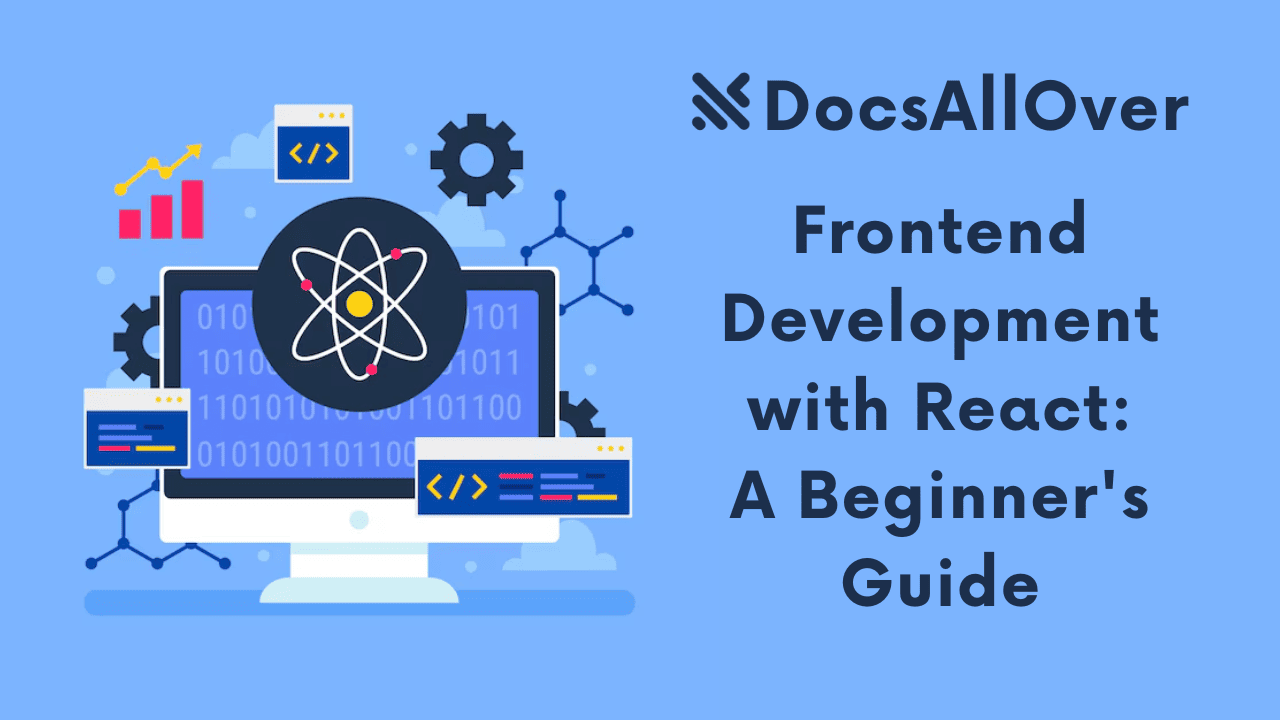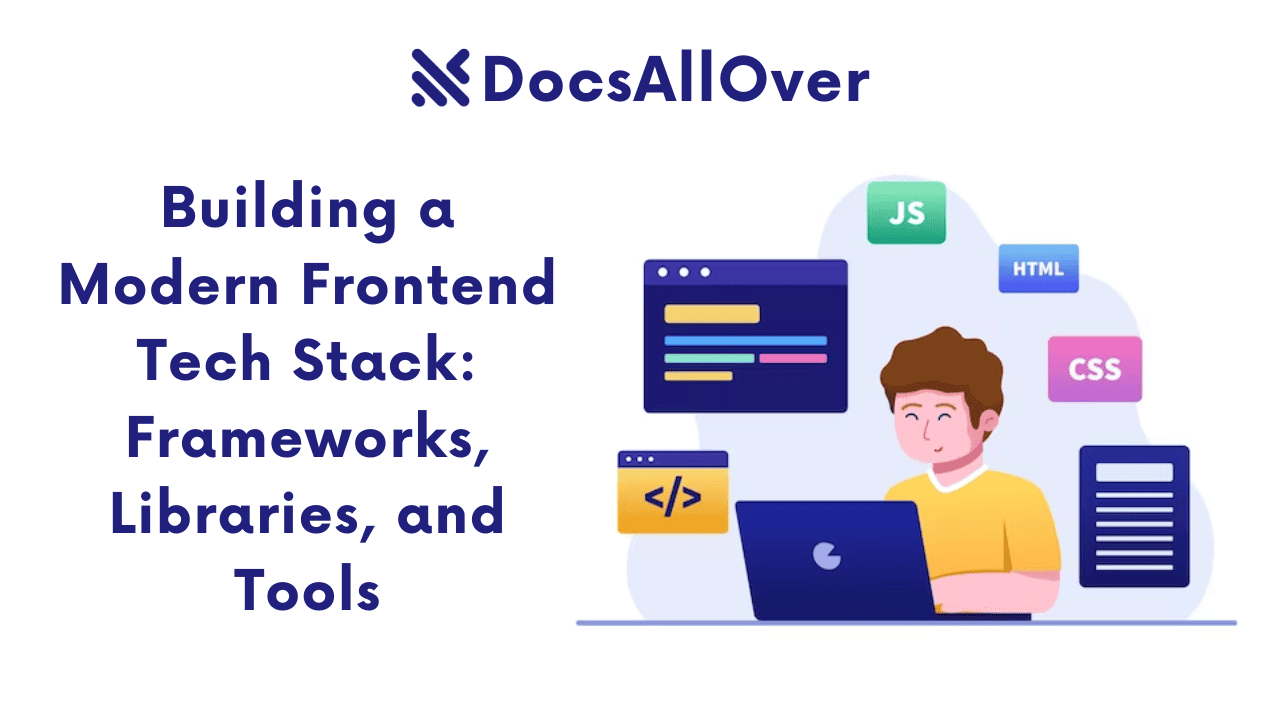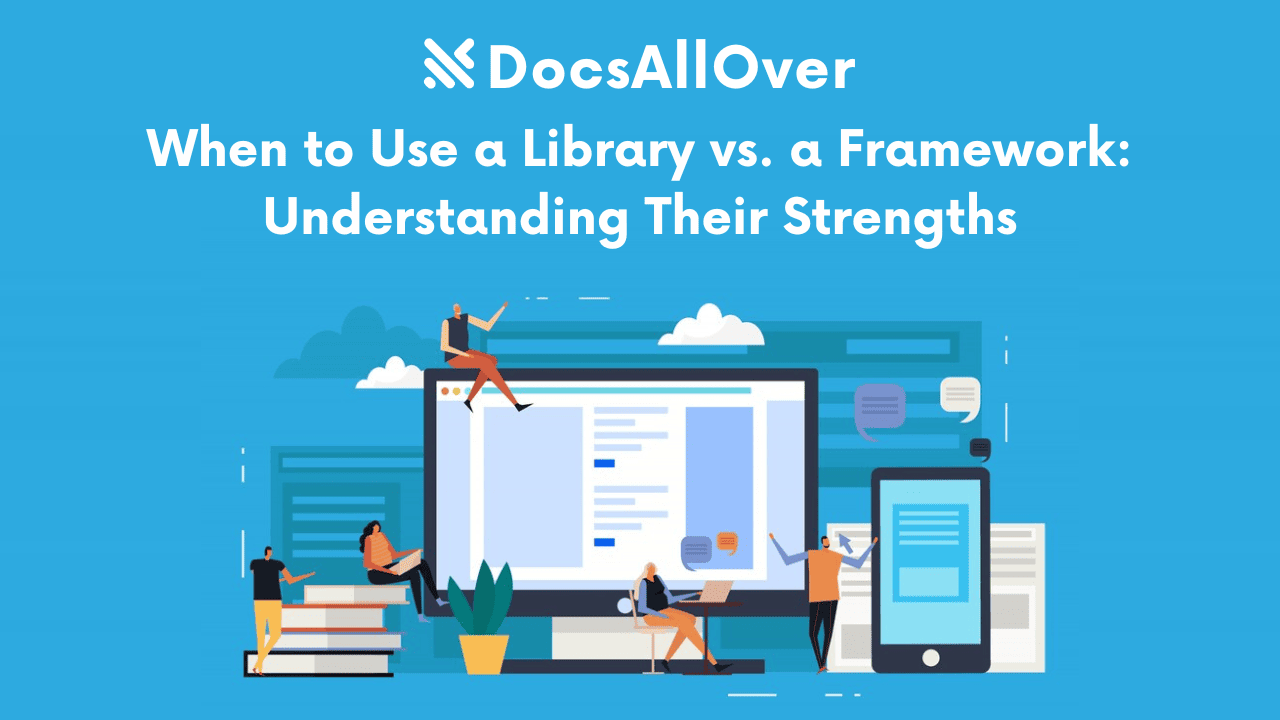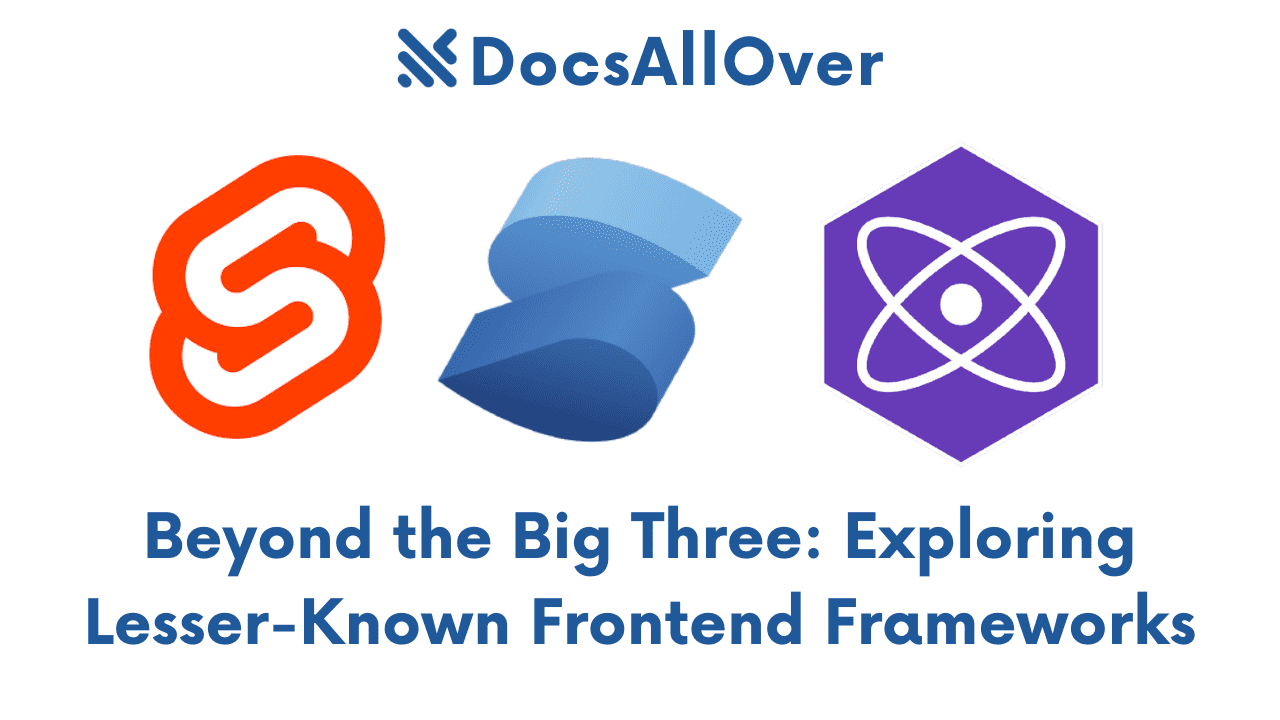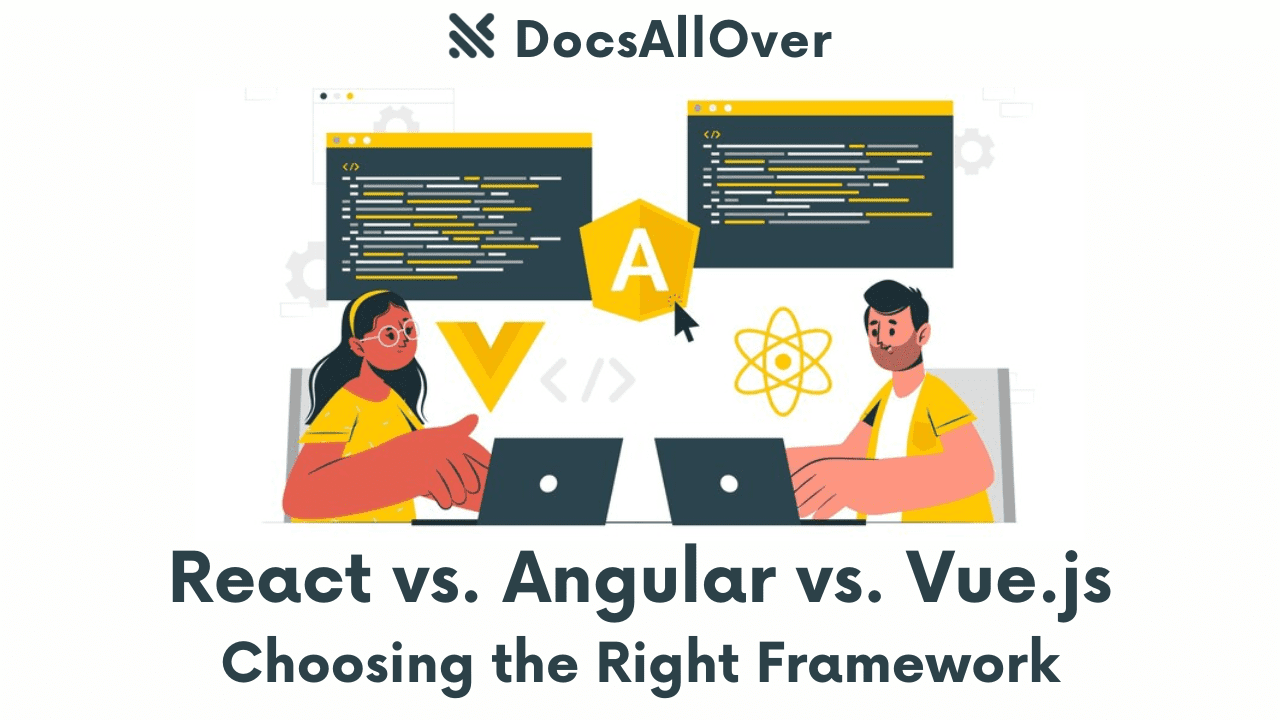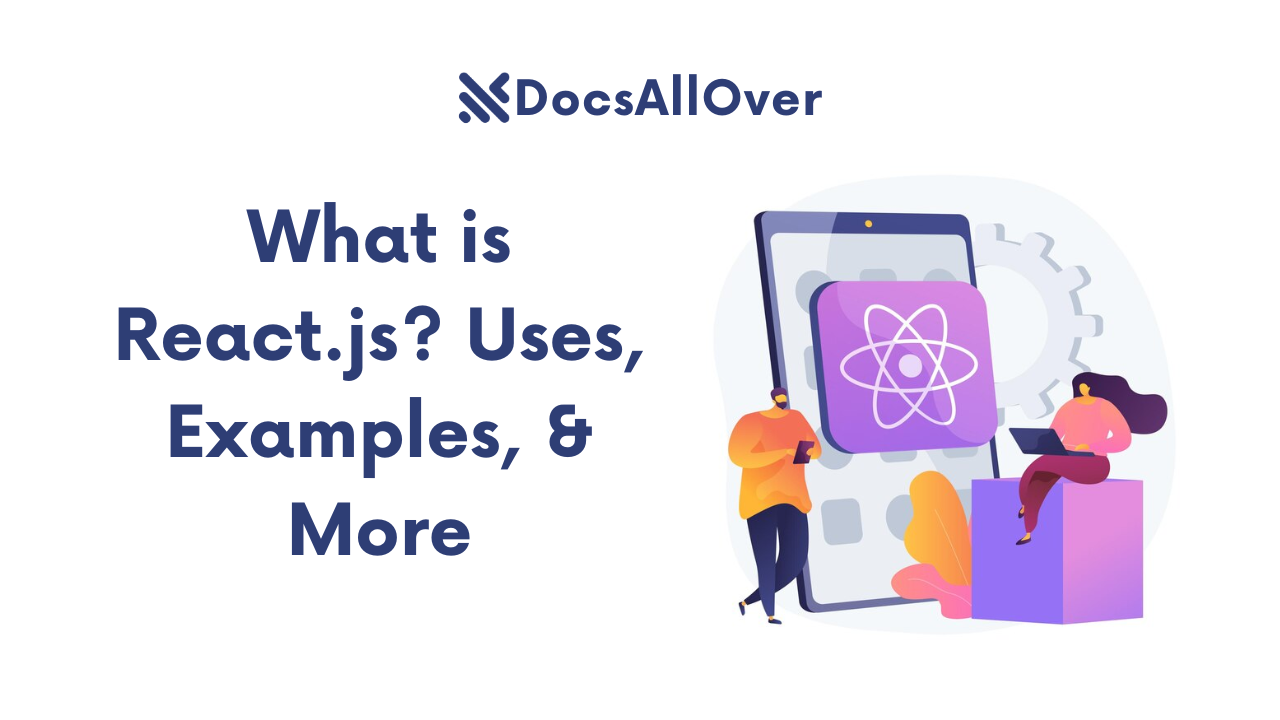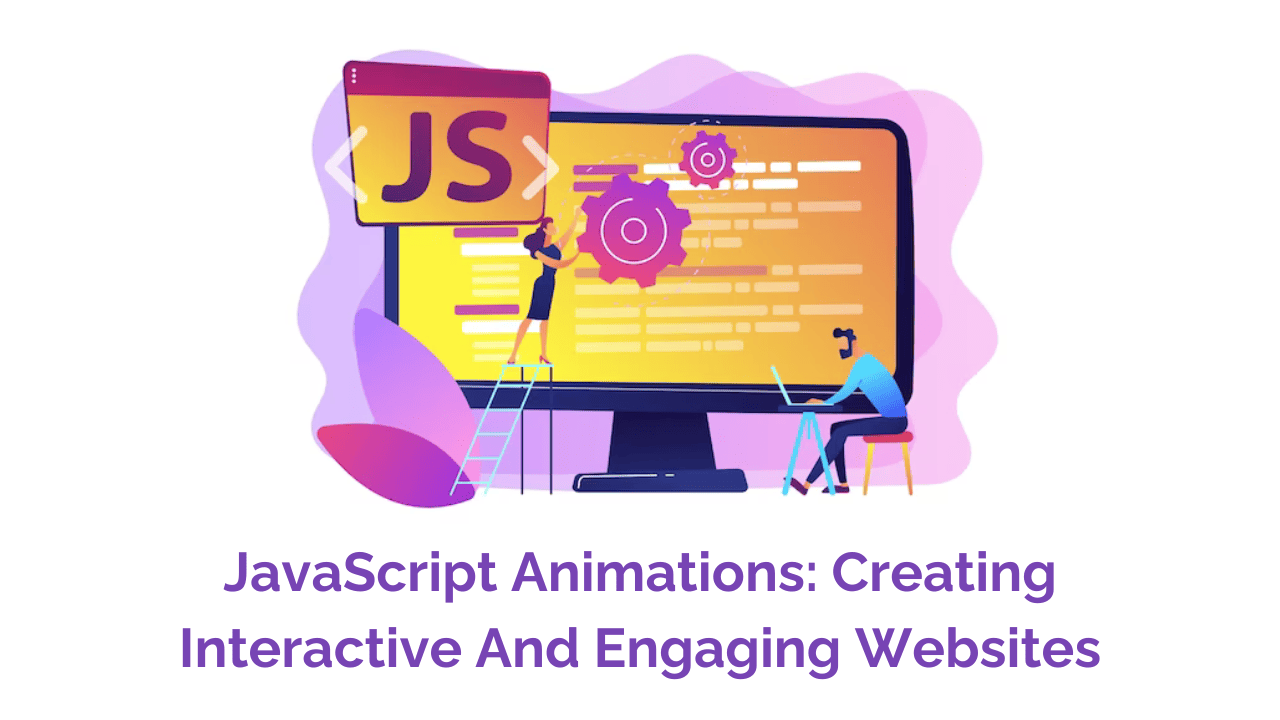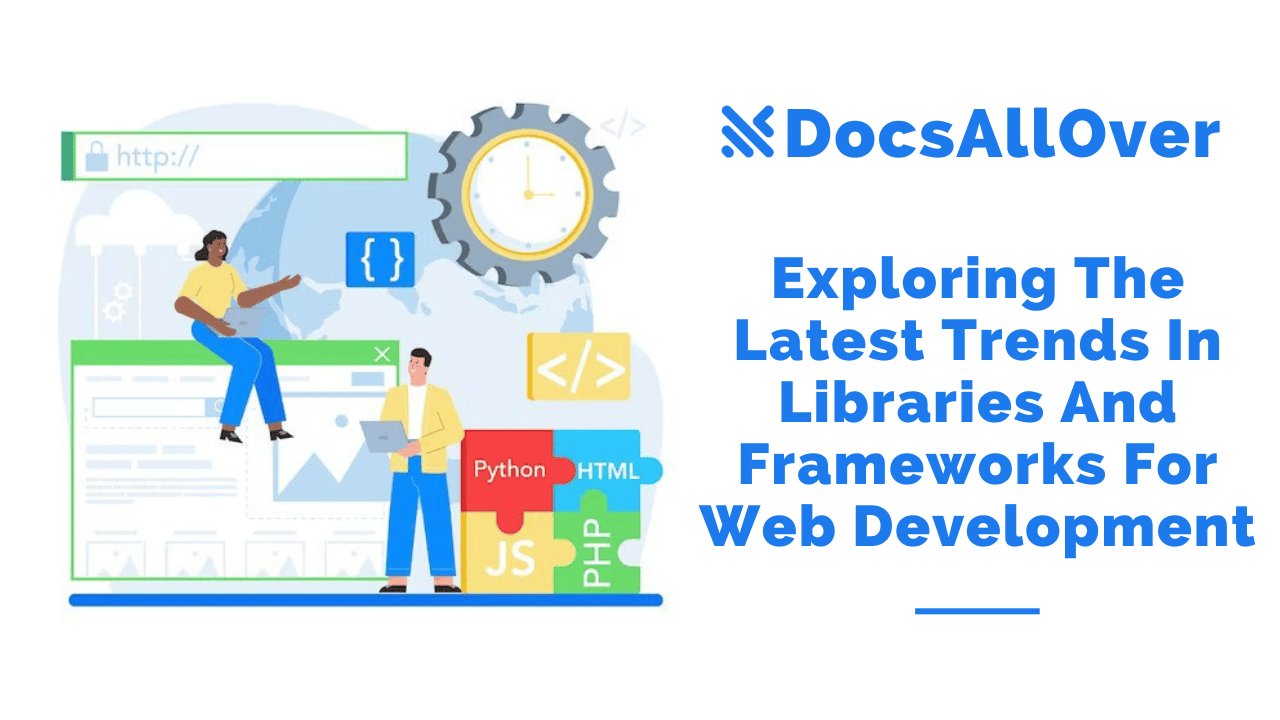Choosing the Right Web Development Framework: A Comprehensive Guide
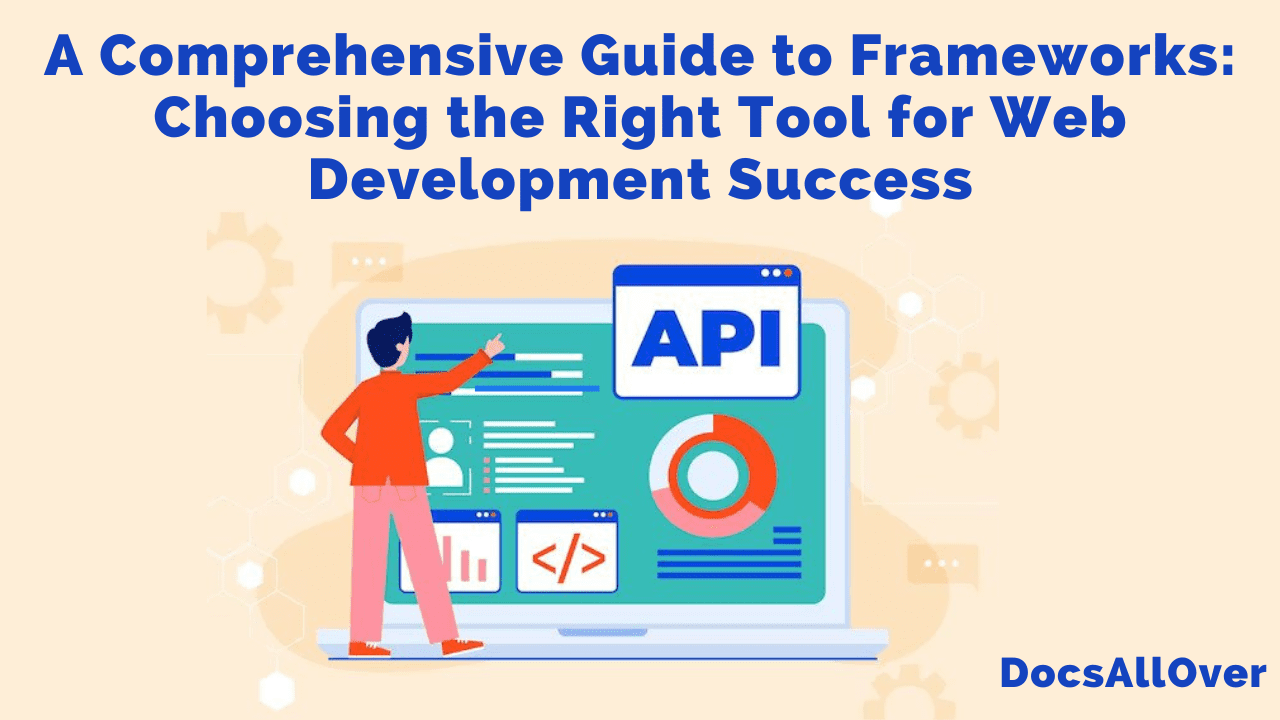
Web development frameworks are a powerful tool for businesses looking to create fast, secure, and reliable websites. With the rapid advancement of technology, web apps today can compete with native applications in terms of usability and interactivity. However, developing custom web applications requires a significant amount of expertise and technology. Fortunately, web development frameworks can make the process easier and more efficient.
A web development framework is a collection of software tools and libraries that provide developers with a structured approach to creating web applications, including web services, web resources, and web APIs (Application Programming Interfaces)
Why Is It Important To Choose An Effective Software Development Framework?
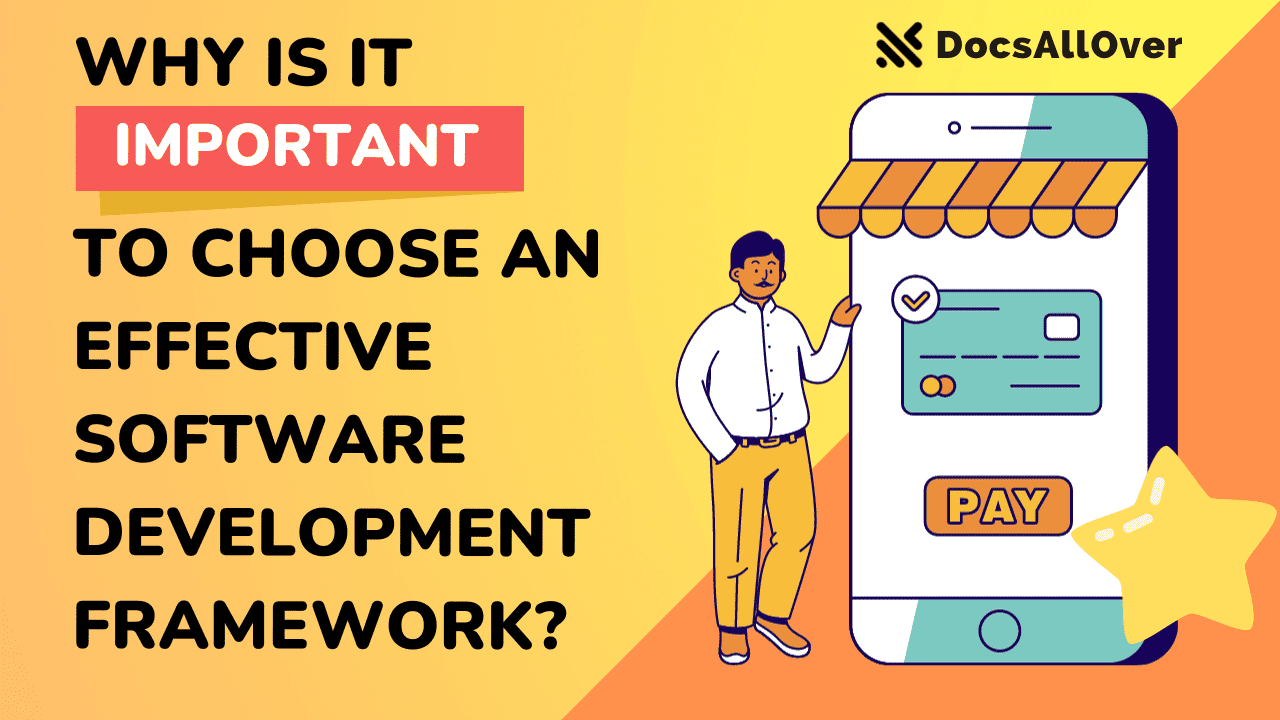
Choosing an effective software development framework is important for a number of reasons, including:
Increased productivity and efficiency:
Software development frameworks provide developers with a pre-built set of tools and libraries, which can significantly reduce the amount of time and effort required to develop a software application. For example, many frameworks provide pre-built authentication and authorization systems, database access layers, and templating systems. This can free up developers to focus on the unique aspects of their application, rather than having to re-implement common functionality from scratch.
Improved code quality and maintainability:
Software development frameworks encourage developers to follow best practices and coding standards. This can lead to improved code quality and maintainability, which can make the code easier to read, debug, and update. Additionally, many frameworks provide built-in testing and debugging tools, which can help developers to identify and fix errors early on in the development process.
Reduced development costs:
By increasing productivity and improving code quality, software development frameworks can help to reduce the development costs of software applications. Additionally, many frameworks are open source and free to use, which can further reduce costs.
Enhanced security and performance:
Software development frameworks can help to improve the security and performance of software applications by providing built-in security features and code optimization techniques. For example, many frameworks provide built-in protection against common security vulnerabilities, such as cross-site scripting and SQL injection. Additionally, many frameworks provide code profiling and optimization tools, which can help developers to identify and fix performance bottlenecks.
Reduced risk:
When choosing a popular and well-supported software development framework, developers can be confident that the framework is well-tested and reliable. This can reduce the risk of encountering unexpected problems during development.
Improved community support and documentation:
Many popular software development frameworks have active communities of developers who contribute to the framework and provide support to other users. This can be a valuable resource for developers who need help with troubleshooting problems or learning new features.
Improved collaboration:
Software development frameworks can help to improve collaboration between developers by providing a common set of tools and terminology. This can make it easier for developers to work together on the same project and to share code with each other.
Reduced time to market:
Software development frameworks can help to reduce the time to market for software applications by providing developers with a pre-built set of tools and libraries. This can allow developers to focus on the unique aspects of their application, rather than having to re-implement common functionality from scratch.
Here are some additional suggestions for choosing the right web development framework for your business:
- Do your research. There are many different web development frameworks available, so it is important to do your research and compare different options before making a decision.
- Consider your needs. What are the specific requirements of your web application? What features and functionality do you need? Once you have a clear understanding of your needs, you can start to narrow down your choices of frameworks.
- Think about your team. What programming languages and frameworks are your team members familiar with? It is important to choose a framework that your team is comfortable with, as this will help to ensure a smooth and efficient development process.
- Read reviews. See what other developers have to say about different web development frameworks. This can be a helpful way to learn about the pros and cons of different frameworks.
Overall, choosing an effective software development framework is an important decision that can have a significant impact on the success of a software development project. By carefully considering the benefits listed above, businesses can choose a framework that is well-suited to their specific needs and requirements.
However, with so many different web development frameworks available, it can be difficult to know which one is right for your project. In this comprehensive guide, we will discuss the key factors to consider when choosing a web development framework, as well as some of the most popular frameworks available today.
Factors to Consider When Choosing a Web Development Framework
When choosing a web development framework, there are a number of factors to consider, including:
- Project requirements: What are the specific requirements of your web development project? What features and functionality do you need? Once you have a clear understanding of your requirements, you can start to narrow down your choices of frameworks.
- Team familiarity: What programming languages and frameworks are your team members familiar with? It is important to choose a framework that your team is comfortable with, as this will help to ensure a smooth and efficient development process.
- Community support and documentation: A strong community and comprehensive documentation can be invaluable resources for developers. When choosing a framework, be sure to consider the size and activity of the community, as well as the availability of documentation and tutorials.
- Performance and scalability: If your web application is expected to experience high traffic levels, you will need to choose a framework that can handle the load. Be sure to research the performance and scalability of different frameworks before making a decision.
- Security: Security is a critical consideration for any web application. When choosing a framework, be sure to consider its security features and track record.
- Cost: Some web development frameworks are free and open source, while others require a commercial license. Be sure to factor in the cost of the framework when making your decision.
- Learning curve: Some web development frameworks are easier to learn than others. If you are new to web development, you may want to choose a framework with a lower learning curve.
- Popularity: Popular web development frameworks tend to have more community support and documentation. However, less popular frameworks may be a better choice if you need a more customized solution.
Once you have considered all of the relevant factors, you can start to narrow down your choices of web development frameworks. To help you make a decision, you can read reviews from other developers, compare the features and functionality of different frameworks, and try out a few different frameworks to see which one you prefer.
Popular Web Development Framework Types
Web development frameworks are a powerful tool for businesses looking to create fast, secure, and reliable websites. They provide developers with a structured approach to building web applications, including web services, web resources, and web APIs (Application Programming Interfaces).
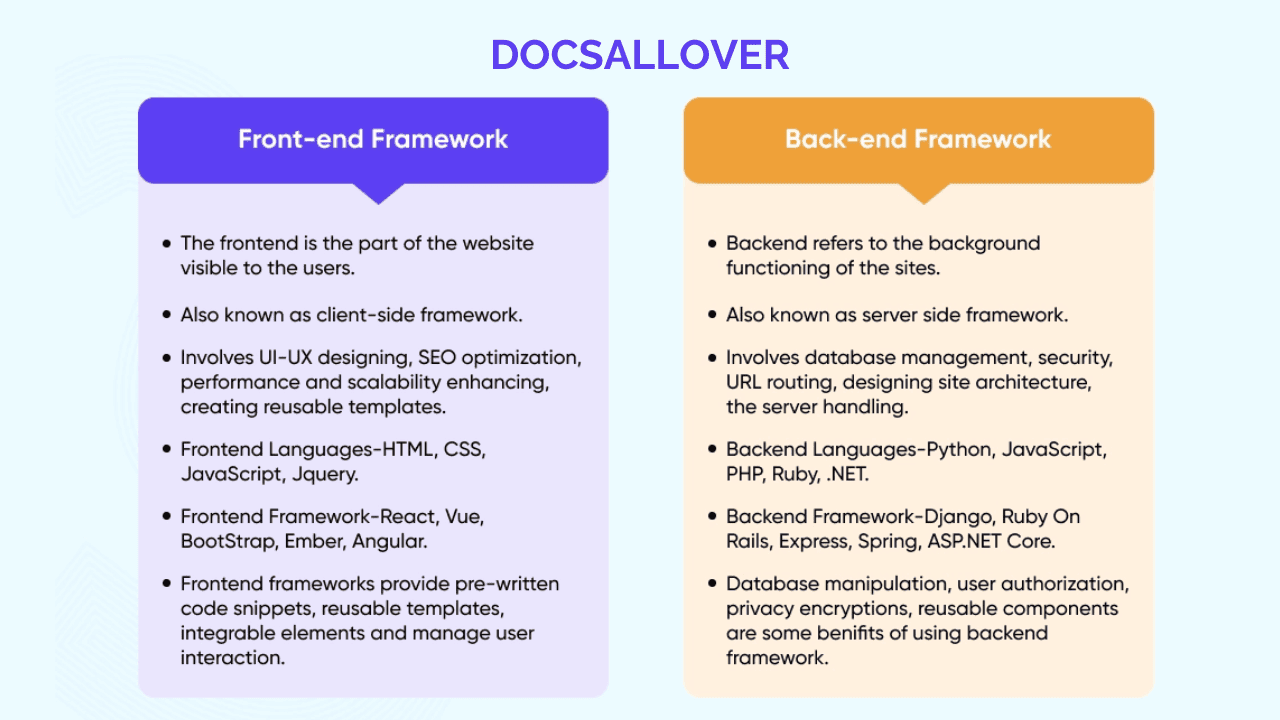
There are many different types of web development frameworks, each with its own strengths and weaknesses. Some of the most popular web development framework types include:
Full-stack frameworks:
Full-stack frameworks provide a complete set of tools and libraries for developing both the front-end and back-end of a web application. This means that developers can use a single framework to build the entire application, from the user interface to the server-side logic. Popular full-stack frameworks include Ruby on Rails, Django, and Laravel.
Front-end frameworks:
Front-end frameworks are used to develop the user interface of a web application. This includes the HTML, CSS, and JavaScript code that is used to create the look and feel of the application. Popular front-end frameworks include React, Angular, and Vue.js.
Back-end frameworks:
Back-end frameworks are used to develop the server-side logic of a web application. This includes the code that handles database interactions, user authentication, and other server-side tasks. Popular back-end frameworks include Express.js, Flask, and Spring Boot.
Microframeworks:
Microframeworks are lightweight frameworks that provide a minimal set of features. This makes them ideal for developing small and simple web applications. Popular microframeworks include Flask, Express.js, and Sinatra.
API frameworks:
API frameworks are used to develop web APIs. Web APIs are interfaces that allow applications to communicate with each other. Popular API frameworks include REST API frameworks like Django REST Framework and Flask-RESTful, and GraphQL frameworks like Apollo Server and Hasura.
Popular Web Development Frameworks
Django:
Django is a Python-based framework that is known for its speed, scalability, and security. Django is a good choice for a variety of web projects, including e-commerce sites, social networking sites, and content management systems.
Ruby on Rails:
Ruby on Rails is a Ruby-based framework that is known for its rapid development capabilities. Ruby on Rails is a good choice for startups and other projects where time to market is critical.
Laravel:
Laravel is a PHP-based framework that is known for its elegance and simplicity. Laravel is a good choice for a variety of web projects, including e-commerce sites, blogs, and content management systems.
Express.js:
Express.js is a Node.js framework that is known for its speed and flexibility. Express.js is a good choice for building APIs, real-time applications, and other web applications that require high performance.
React:
React is a JavaScript library that is used for building user interfaces. React is known for its speed, scalability, and composability. React is a good choice for building complex and dynamic web applications.
Angular:
Angular is a JavaScript framework that is used for building web applications. Angular is known for its comprehensive features, including two-way data binding, routing, and dependency injection. Angular is a good choice for building large-scale enterprise web applications.
Vue.js:
Vue.js is a JavaScript library that is used for building user interfaces. Vue.js is known for its simplicity and flexibility. Vue.js is a good choice for building small to medium-sized web applications.
8 things to consider before choosing a web development framework, in detail:
A framework is a collection of code that provides a more comprehensive set of functionality. Frameworks typically include libraries, but they also provide additional features, such as code organization, routing, and templating. Frameworks are typically used to build new software applications from the ground up.:
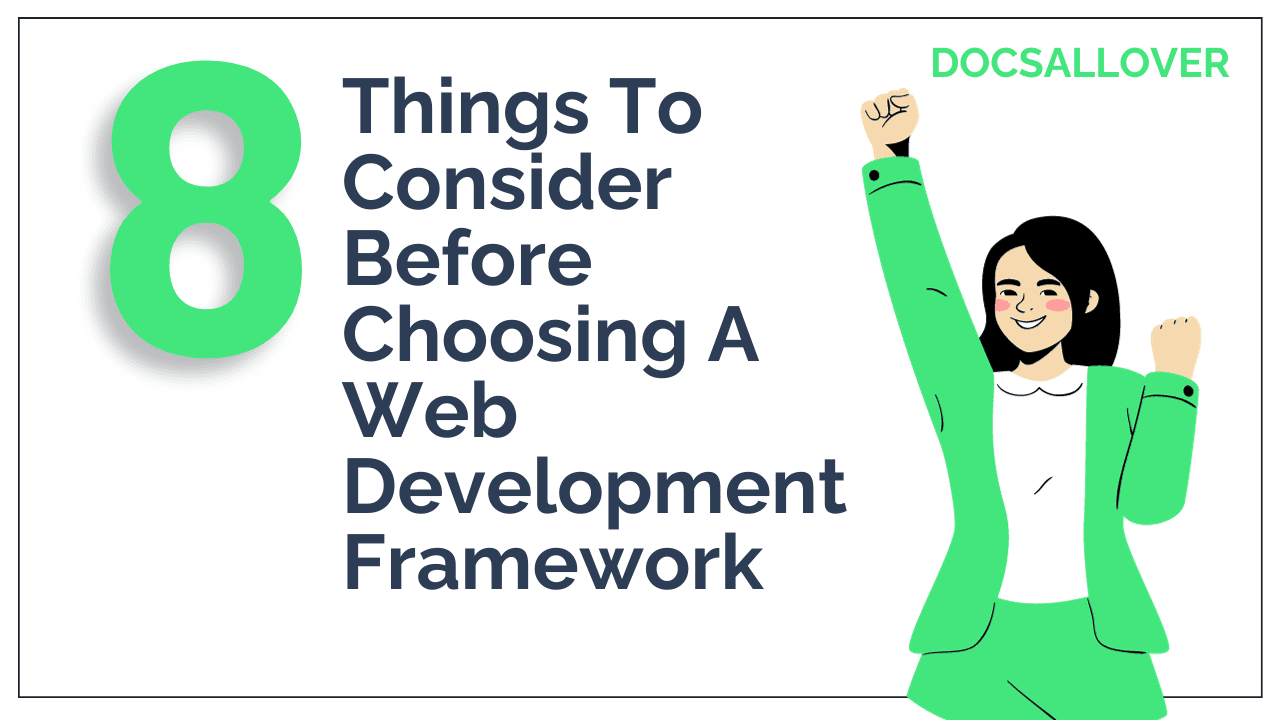
1. Project requirements
What are the specific requirements of your web application? What features and functionality do you need? Once you have a clear understanding of your requirements, you can start to narrow down your choices of frameworks.
For example, if you are developing a simple blog, you may want to choose a lightweight framework like Flask or Sinatra. However, if you are developing a complex e-commerce website, you may want to choose a full-stack framework like Ruby on Rails or Laravel.
2. Team skills and experience
What programming languages and frameworks are your team members familiar with? It is important to choose a framework that your team is comfortable with, as this will help to ensure a smooth and efficient development process.
If your team is new to web development, you may want to choose a framework with a lower learning curve. Additionally, if your team has experience with a particular programming language, you may want to choose a framework that is built on that language.
3. Community support and documentation
A strong community and comprehensive documentation can be invaluable resources for developers. When choosing a framework, be sure to consider the size and activity of the community, as well as the availability of documentation and tutorials.
A large and active community can provide support and advice when you encounter problems. Comprehensive documentation can help you to learn the framework and use it effectively.
4. Performance and scalability
If your web application is expected to experience high traffic levels, you will need to choose a framework that can handle the load. Be sure to research the performance and scalability of different frameworks before making a decision.
Some frameworks are more performant and scalable than others. For example, Ruby on Rails is known for its speed and scalability, while Django is known for its security and reliability.
5. Security
Security is a critical consideration for any web application. When choosing a framework, be sure to consider its security features and track record.
Some frameworks have built-in security features that can help to protect your application from common attacks. For example, Django has built-in protection against cross-site scripting and SQL injection.
6. Cost
Some web development frameworks are free and open source, while others require a commercial license. Be sure to factor in the cost of the framework when making your decision.
Free and open source frameworks can be a good option for businesses with limited budgets. However, commercial frameworks can offer additional features and support.
7. Learning curve
Some web development frameworks are easier to learn than others. If you are new to web development, you may want to choose a framework with a lower learning curve.
Some frameworks are designed to be easy to learn and use, while others are more complex and require more experience. For example, Flask is a lightweight framework with a relatively low learning curve, while Django is a full-stack framework with a higher learning curve.
8. Understanding Libraries and Frameworks
Libraries and frameworks are two important concepts in software development. They are both collections of pre-written code that developers can use to build their own software applications. However, there are some key differences between the two.
A library is a collection of code that provides specific functionality or services. For example, a library might provide functions for working with strings, dates, or databases. Libraries are typically used to solve specific problems or to add new features to existing software applications.
Once you have considered all of these factors, you can start to narrow down your choices of web development frameworks. To help you make a decision, you can read reviews from other developers, compare the features and functionality of different frameworks, and try out a few different frameworks to see which one you prefer.
Real-World Examples and Use Cases:
| Company | Web development framework | Use case |
|---|---|---|
| Airbnb | Ruby on Rails | Airbnb is a complex web application that requires a framework that is fast, scalable, and secure. Ruby on Rails is a full-stack framework that meets all of these requirements. |
| Django | Reddit is a large social networking site with millions of users. Django is a full-stack framework that is known for its security and reliability. | |
| Netflix | Express.js | Netflix is a streaming service that requires a framework that can handle high traffic levels. Express.js is a lightweight framework that is known for its performance and scalability. |
| Flask | Twitter is a social networking site that needs a framework that can handle a large number of concurrent requests. Flask is a lightweight framework that is known for its simplicity and speed. | |
| React | Facebook is a social networking site with a complex user interface. React is a front-end framework that is known for its speed and flexibility. | |
| YouTube | Angular | YouTube is a video-sharing platform with a complex user interface. Angular is a front-end framework that is known for its scalability and maintainability. |
Remember, libraries and frameworks are powerful tools, but it's crucial to choose and utilize them judiciously based on project requirements and long-term scalability goals.
